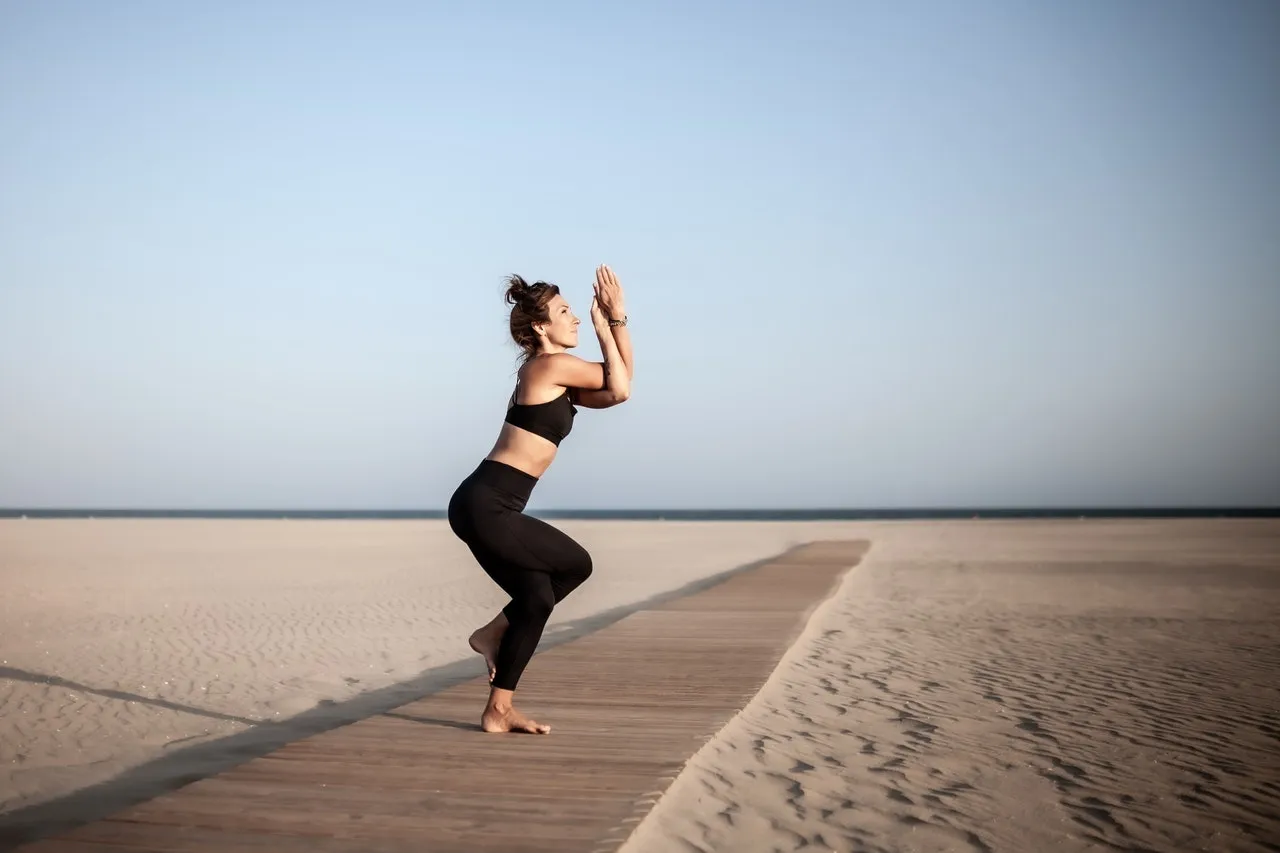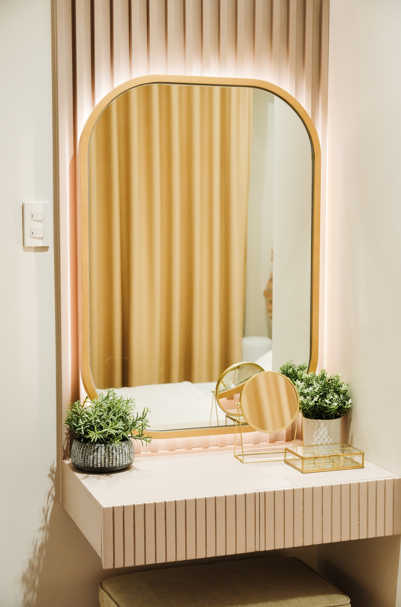8 Quick Yoga Exercises You Can Do To Relieve Stress at Home
How do you handle your stress? Do you go out and splurge at the mall? Do you eat your stress away? Or maybe drink until you drop? Obviously, these are unhealthy ways to deal with stress. They could lead to acne, headaches, chronic pain, depression, or—worse yet—heart problems, according to Healthline.
Good thing, there are plenty of healthy ways to beat stress, such as going out for a night run and/or hitting the gym or swimming in your condo’s pool. But if you don’t have the time or the resources to do these and with the rainy season fast approaching, you can try these yoga exercises at home or these quick exercise tips, to relieve stress in practical ways.
Yoga is a physical, mental, and spiritual exercise that originated in India. The practice uses a combination of physical postures, breathing techniques and meditation, to improve control of the mind and body. And because yoga can be done in a small space, it’s one of the most popular exercises anyone can do in a condo unit. It’s so easy to do, in fact, that you can learn how to start yoga by yourself, especially if you want a relaxing time exercising in your condo.
Tadasana
The tadasana is the foundation of most standing poses in yoga. This pose will help you improve your posture, strengthen your legs, firm up your abs and buttocks as well as align flat feet.
Stand on your feet with the big toes touching and heels slightly apart. Get your weight balanced evenly across your feet. You'll then have to firm your thigh muscles and lift your knee caps. Do this without hardening your lower belly. Press your shoulder blades into your back and release it. Balance your head over your pelvis. Stay in this pose for 30 seconds to 1 minute.
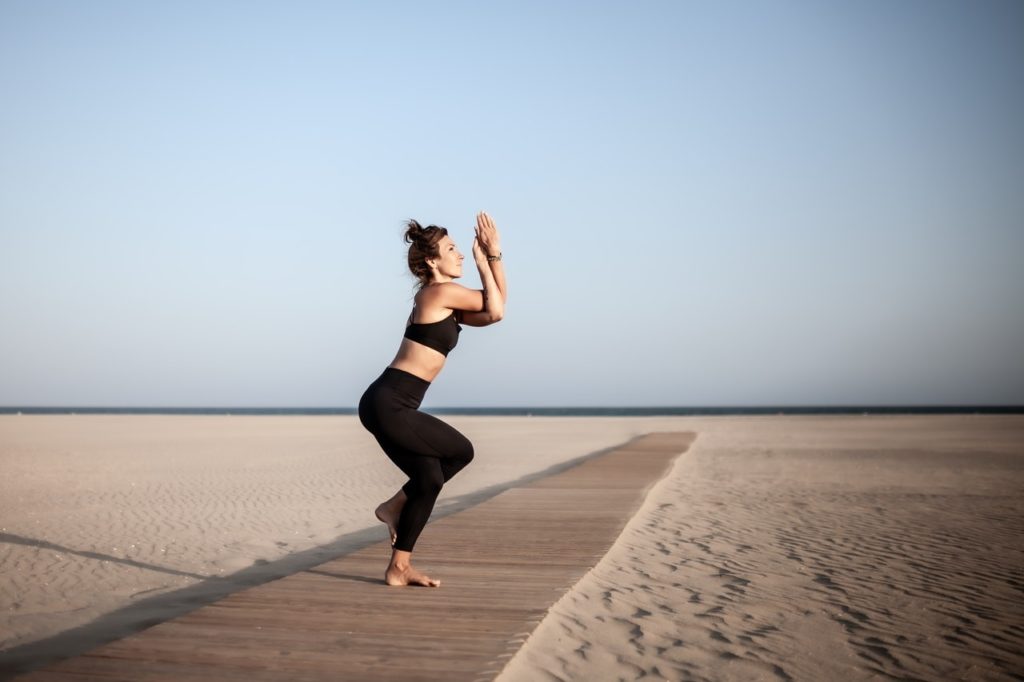 Photo courtesy of Marcin Korytowski via Pexels
Photo courtesy of Marcin Korytowski via Pexels
Eagle Pose
No, this isn’t Dante Gulapa’s signature pose. It’s an easy yoga pose that focuses on common spots where emotional tension happens.
If you want to try this, like anyone wondering how to start yoga at home, you’ll first have to learn the most common starting position of yoga called tadasana or mountain pose. Place your right arm over your left then bend your elbows to bring the palms or, at least, the back of the hands together. Stand on your right foot and bend your knees a little then wrap your left leg over and around it. Make sure to release your position slowly when done.
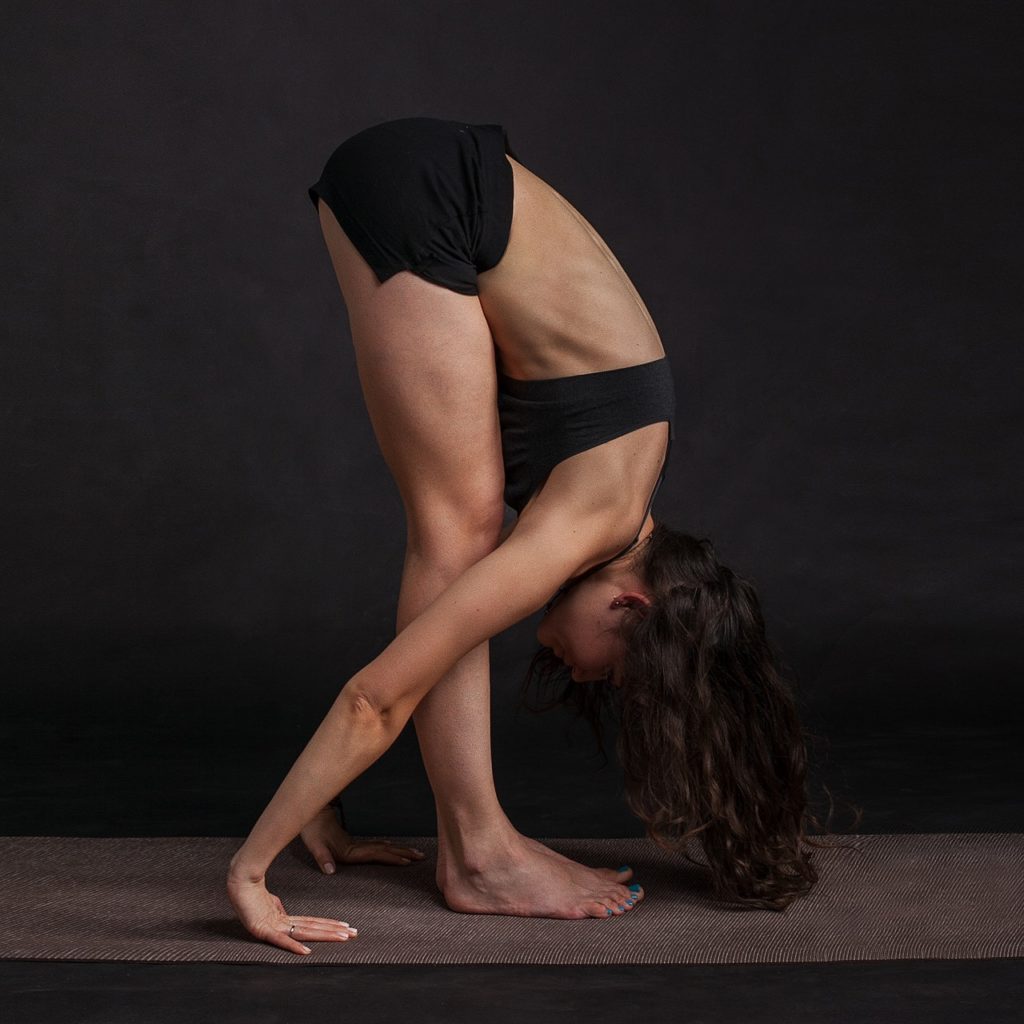 Photo courtesy of Roman Davayposmotrim via Pexels.com
Photo courtesy of Roman Davayposmotrim via Pexels.com
Standing Forward Fold
If you are thinking of a lot of things, the standing forward fold is a good yoga position for beginners like you, to help clear your mind. Again, start with the tadasana. Bend forward until you reach your feet. It’s similar to the standing forward bend, except you have to hold your elbows with your hands upfront. Hold it for a few breaths then slowly come out of the pose.
Fierce or chair pose
Another yoga pose for stress relief is the fierce pose (a.k.a. the chair pose). This pose will work your arm and leg muscles and stimulate the heart and diaphragm. This pose will help strengthen your ankles, thighs, calves, and spine.
Begin with the tadasana pose; inhale, as you raise your arms with palms facing inward. As you exhale, slowly bend your knees as if you’re trying to sit on a chair. Your knees should extend beyond your ankle. Lift your rib cage to be nearly vertical and keep your neck long. Try to stay in that position for 30 seconds. Come out of it by straightening your knees while inhaling, then exhale as you lower your arms into tadasana.
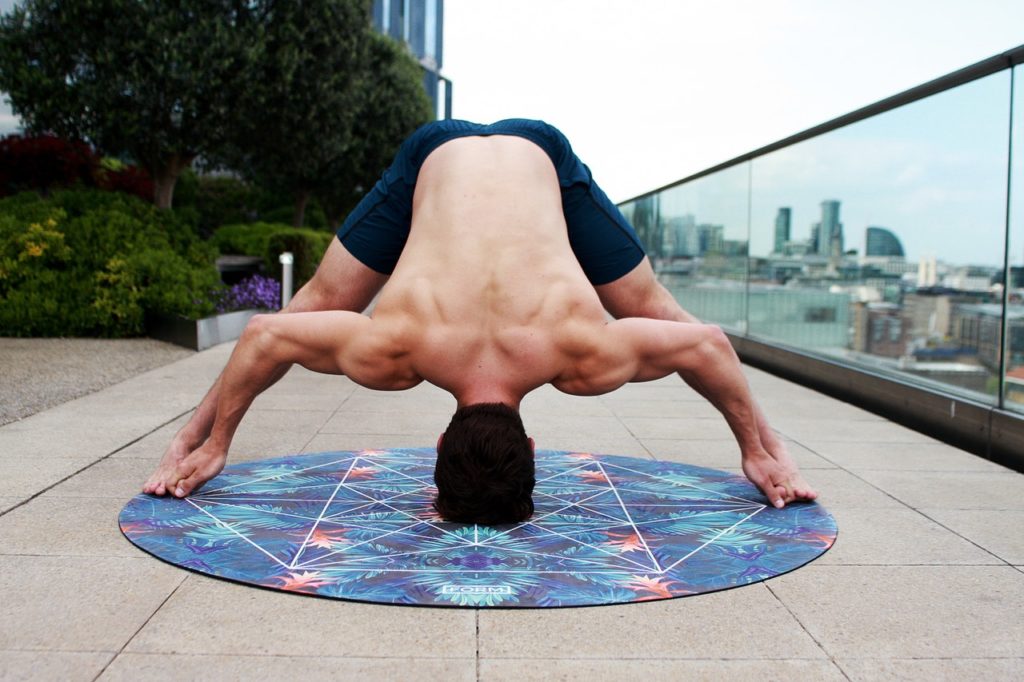 Photo courtesy of theformfitness via Pexels
Photo courtesy of theformfitness via Pexels
Wide-legged forward bend
If you need a beginner’s yoga pose for anxiety and depression, the wide-legged forward bend is a good choice. It is said to be good for headache, fatigue, and mild depression; it also calms the brain.
Begin with the tadasana pose. Spread your legs around three to four feet apart, depending on your height. Rest your hands on your hips and inhale. As you exhale, bring your head and hands to the floor. Inhale, as you raise your head to torso level; exhale, as you bend down, again. Inhale, as you come out of the pose; and rest your arms on your hips. Exhale, as you raise your head back to tadasana pose.
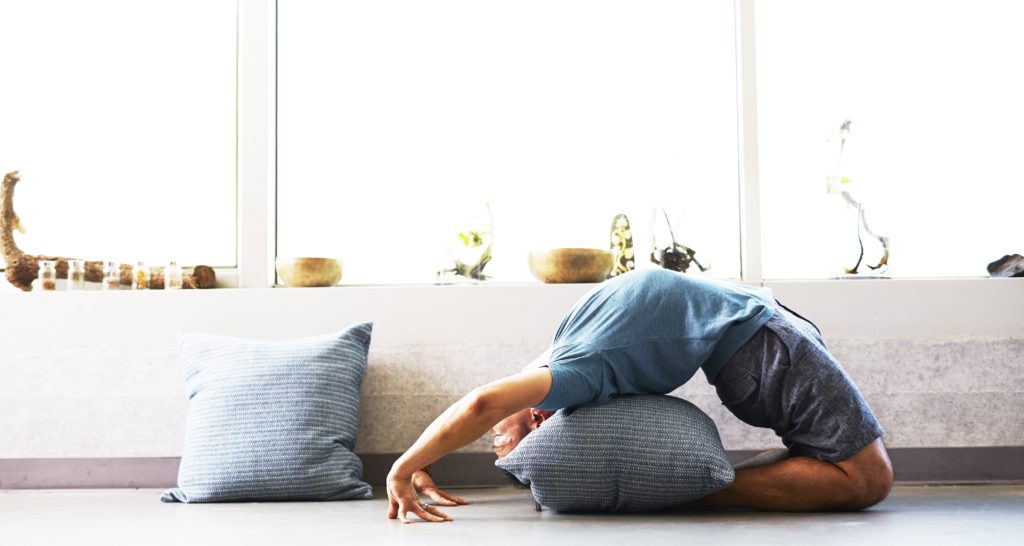 Photo courtesy of Wee Lee via Unsplash
Photo courtesy of Wee Lee via Unsplash
Bridge Pose
According to Yoga Journal, a good yoga pose for anxiety disorder is the bridge pose. It stretches the chest, neck, and spine, enough to calm the brain and help reduce anxiety, fatigue, stress, and mild depression. You need to have a yoga mat for this pose if you want to learn how to do yoga at home safely.
Lie down on the floor. Bend your knees and bring your feet close to your hips. Exhale, as you raise your hips. Stay in this pose for 30 seconds to 1 minute. Release the pose, as you exhale, and slowly lower your spine down on the floor.
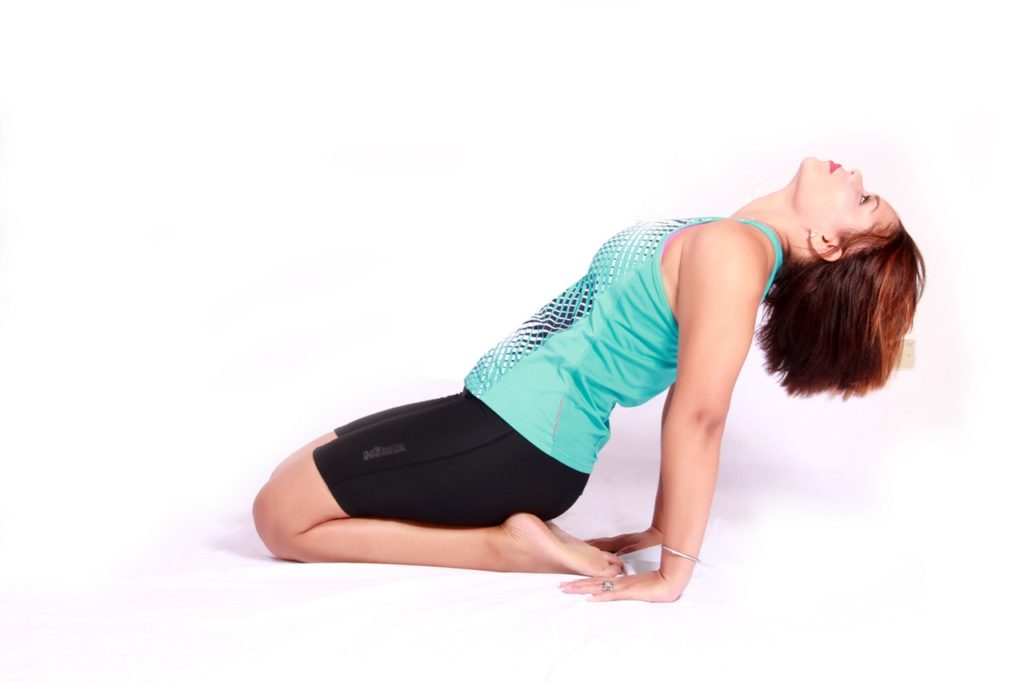 Photo courtesy of Pixabay via Pexels
Photo courtesy of Pixabay via Pexels
Thunderbolt Pose
The thunderbolt pose is a gentle yoga position for those with anxiety. A known benefit of this pose is that it stabilizes the mind and body and improves blood circulation, particularly in the legs.
Start by kneeling on your yoga mat. Bend down and place your hands on the mat. Make sure your hips and knees are perpendicular. Rest your buttocks on the balls of your feet. Rest your arms on your thighs. Come out of the posture by slowly moving forward and resting on all fours.
Low Lunge Pose
You start from a downward-facing dog pose. Begin by lying face down on the mat. Place your hands beside your chest to press up your body. You’ll end up with your hands and knees on the floor. Then move your feet, and raise your hips up.
Here’s where you really start the low lunge pose. Exhale, as you move your right foot forward between your hands. Lower your left knee to the floor. Hold for a minute then repeat with your left foot forward.
The low lunge pose is great for stretching the legs, hamstrings, groin, and hips. It also improves your concentration, balance, core awareness and clears your mind, making this one of the best types of yoga for anxiety.
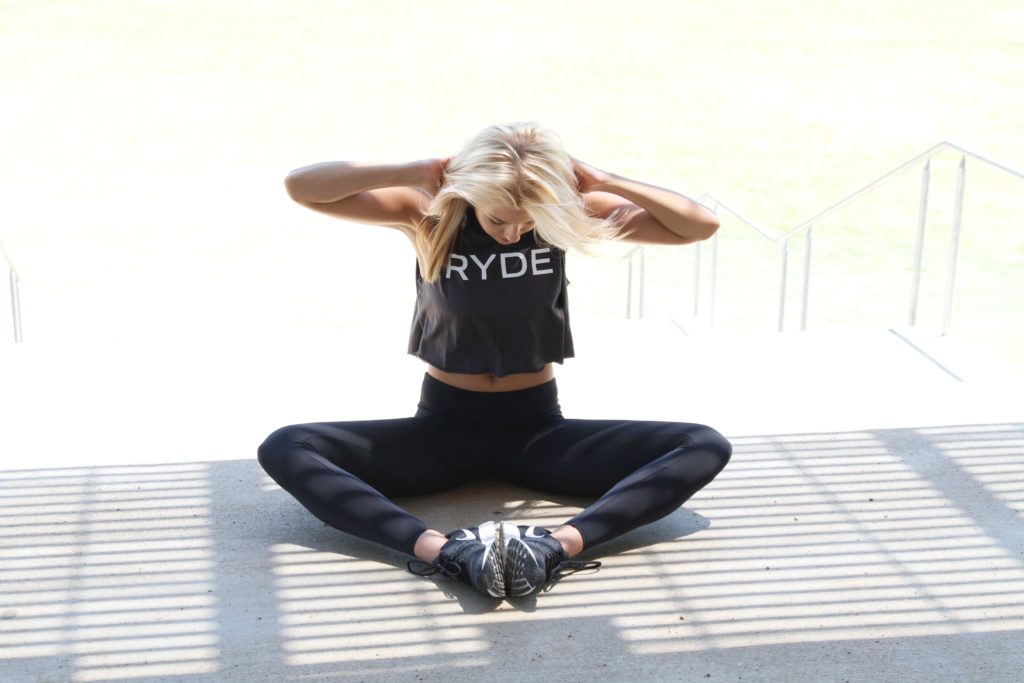 Photo courtesy of Lauren via Unsplash
Photo courtesy of Lauren via Unsplash
Reclined Bound Angle Pose
One of the calming yoga poses you can do at home is the reclined bound angle pose. This helps relieve stress, mild depression, menstruation, and menopause.
Begin by rolling a mat or a blanket to support your spine. Lie down on it with your feet flat on each other. You don’t need to push your knees to the floor because you need to relax it. You can support your legs with a set of pillows on each side. After which, spread your arms to the side. Stay in this position for as long as you like.
With these home yoga positions, you’ll be able to easily relieve a day’s worth of stress and exercise in a matter of minutes even during the rainy season. The best thing about this is that you don’t need any fancy equipment, and you can do it even in small areas, like a condo unit.
